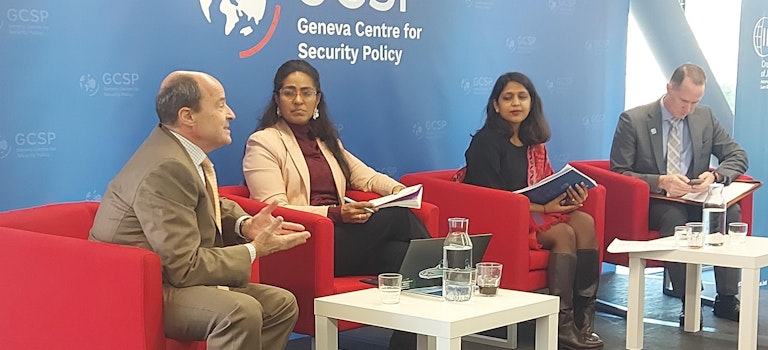Women and girls have a right to effectively participate in and lead efforts to achieve climate justice, as equal rights holders and agents of change. In many contexts, women are already at the forefront of climate action, serving as change catalysts who possess diverse knowledge and skills essential for transformative climate action. However, structural gender inequalities continue to undermine the meaningful participation of women and girls in climate action. As the international community strives to implement mitigation and adaptation solutions, develop loss and damage mechanisms and undertake strategies to enable a just transition for all, it is imperative that the potential of the rule of law is understood and utilised as a critical enabler in catalysing feminist climate justice and ensuring that women and girls are central to all initiatives.
On 15 November, the International Development Law Organization (IDLO) and the International Gender Champions (IGC) Secretariat hosted an in-person and online Panel Discussion on Rule of Law Solutions to Catalyse Feminist Climate Action at the Geneva Centre for Security Policy (GCSP).
Panellists included Jean-Pierre Reymond, Executive Director of 2050Today, Mayte Gonzalez, Head of Human Rights in Conservation, International Union for Conservation of Nature and Natural Resources (IUCN), Nupur Prakash, IDLO Gender and Law Analyst, and Adenike Oladosu, Youth Climate Justice Activist, Founder of ILeadClimate Action Initiative. The discussion was moderated by Mark Cassayre, Permanent Observer of IDLO to the United Nations and International Organisations in Geneva. Fleur Heyworth, Head of Gender and Inclusive Security at GCSP and Head of the International Gender Champions Secretariat delivered the Opening Remarks.
The panellists shared their expertise and experiences in using legal and justice approaches to promote women’s human rights in relation to climate change, build their resilience to climate impacts and strengthen women's leadership in climate decision-making processes.
Jean-Pierre Reymond stressed that in promoting meaningful climate action “the rule of law is absolutely crucial and fundamental as it seeks to ensure dignity and equal rights” and called for more equal representation of women at the annual Conference of Parties (COP).

Nupur Prakash, referencing the IDLO publication on “Climate Justice for Women and Girls: A Rule of Law Approach to Feminist Climate Action”, emphasised the potential of the rule of law as a tool to dismantle systemic injustices, strengthen women’s access to rights, resources, and representation and build institutional capacity for climate-resilient development. “The rule of law and gender equality are prerequisites for sustainable climate action.”

Mayte Gonzalez shared her views on the importance of bridging the gap between aspiration and implementation in applying a rule of law approach to climate action. She highlighted that Gender Action Plans are already in place to complement various conventions at the international level, but that challenges remain in implementing gender-responsive climate action at the national level. Through Climate Change Gender Action Plans (ccGAPs), IUCN is supporting national governments to bridge this gap and strengthen climate resilience. She also stressed the need for gender-transformative conservation practices to avoid perpetuating or reinforcing systemic inequities and gender-based violence: “Let’s fight discrimination and gender-based violence as a first step.”

According to Adenike Oladosu, research findings from sub-Saharan Africa suggest that women and girls in low-income countries already spend 40 billion hours a year collecting water; a figure that is likely to increase as climate change progresses and resources grow scarcer. She emphasised the urgency of granting women equal access to land rights and promoting gender-smart agriculture as a precondition for participation in climate action: “We need to put women and girls at the centre”.

To learn more about the topic, access the IDLO publication "Climate Justice for Women and Girls: A Rule of Law Approach to Feminist Climate Action" here.
